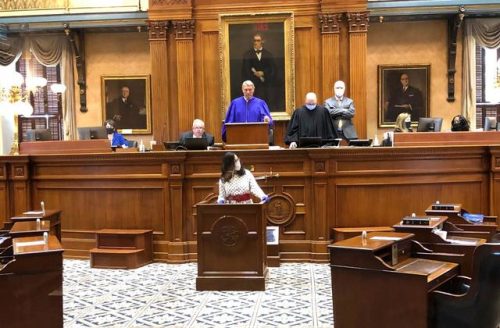Legislative Update: Special September Session Edition
The South Carolina General Assembly completed a two-week legislative session a couple of weeks ago. The special session was an attempt to wrap up as much legislative business as possible before the end of the calendar year to make up for lost session days due to the COVID-19 outbreak. All legislation that has failed to pass by December 31, 2020 will be dead and a new legislature will be sworn in for January 2021 based on the results of next month’s statewide General Election.
PASSED
Fiscal Restraint for Now. Between March and August, the state government’s estimated budget surplus dropped from $750 million to just $86 million. With that in mind, the House side of the lobby chose to keep a Continuing Resolution (CR) in place. That “CR” set state spending for the year beginning July 1, 2020 at 2019 levels. The Senate instead passed a new budget with some new spending, which the House intends to assess in January after more revenue numbers have come in.
Business License Tax Reform Win. Finally! South Carolina has reformed the way businesses are taxed at the local level to allow business owners tax relief, and to create a more standardized application process. It also stops the out-of-state contingency fee-based private tax collectors from harassing South Carolina businesses. You can read our coverage on this important win from February here.
School District Consolidation Baby Steps. Palmetto Promise Institute authored a study calling for the consolidation of tiny and shrinking public school districts in September 2018. Legislation passed in the special session to merge Hampton County 1 (which for reference includes Estill) with Hampton County 2 (which includes Varnville). According to our study, Hampton 1 has the highest percentage of its budget dedicated to Administration of any school district in the state and has lost 51% of its size in twenty years (1997-2017). It was down to 726 students. A similar bill merging two of the three Clarendon County districts passed in January.
Reducing Regulations. The General Assembly is beginning to see that a post-COVID world should have less regulation. During its short session, the legislature passed a bill allowing pharmacists to administer flu vaccines to children younger than 12 using protocols approved by the Board of Medical Examiners. Several bills loosening some restrictions on alcohol sales and sampling were also passed. Here is our coverage of all the relaxed regulations from April.
Energy Freedom? The legislature passed a joint resolution establishing the Electricity Market Reform Measures Study Committee. The Committee is charged with retaining consultants who would assist the members in studying all of the issues that have been raised in recent years in regard to the generation, transmission and distribution of electricity in South Carolina. That would include including total energy choice on the Midwestern or Texas model, and joining a Regional Transmission Organization (RTO) to buy power in real time. See our Palmetto Promise study on how this could be done here.
Absentee Voting. For the November election, South Carolina will be essentially a “no questions asked” absentee voting state. Included is a provision that will allow county election officials to begin processing absentee ballots earlier than normal. This will provide more time to sort through the higher number of absentee ballots expected. This session also saw funding for electronic poll books ending the need for paper printouts for checking in voters.
CARES Act Funding. The General Assembly directed the expenditure of a second tranche of federal CARES Act funding, and repurposed unused education funds from the first phase of CARES. Programs funded included DHEC statewide testing and monitoring, MUSC statewide testing, refilling the coffers of the Unemployment Trust Fund, a nonprofit relief program, a minority and small business relief program, and support for higher education and local government COVID expenses. (Note: The appropriation for higher education has become ensnared in the recent state Supreme Court ruling in Adams v. McMaster. The Department of Administration is rightly asking how any support for students in any private setting could be in compliance with the court’s ruling. The Court sounded an “uncertain trumpet” at best. Either both are legal according to our Constitution or neither are, and the clear answer is both.)
Disaster Relief. The legislature created a State Resilience Office which to assist with understanding flood hazards and taking action to reduce exposure to flooding across the state.
Broadband Accessibility. This legislation allows the state’s electric cooperatives to lease out space on their power poles to high-speed internet providers (including affiliates of the Cooperatives) with an eye toward bridging the digital divide in rural communities. Palmetto Promise hopes this will lead to wider use of virtual schooling and telemedicine, two of our policy priorities.
LEFT ON THE TABLE
Unfortunately, the legislature punted on some very important issues, including comprehensive matters like Santee Cooper, Tax Reform and Education Finance Reform. The state-owned utility is still saddled with enormous debt that will be paid by ratepayers until 2056 unless the agency is sold. Our competitiveness with our neighbor states is being harmed because personal and business tax rates are too high. And, our school funding mechanism? It remains one of the most arcane and unfair in America.
Lawmakers missed the opportunity to pass more targeted reforms as well, like enacting Education Scholarship Accounts (ESAs) to expand opportunity to those children who need it most, and getting rid of Certificates of Need (CON) for healthcare services so that more care is available (and cheaper).
But do not be discouraged. Palmetto Promise is already back in the fight on these and many other issues in our Freedom Agenda. Watch for our forthcoming Policy Playbook, a fall and football-themed wish list of free market reforms for the Palmetto State.






